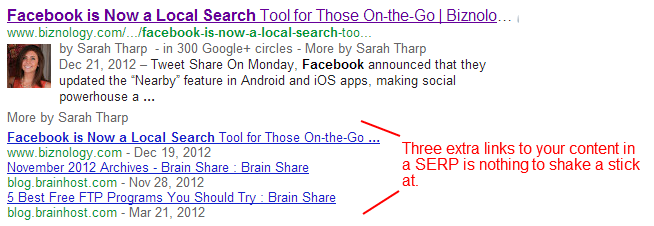Google Authorship is making big waves in the SEO and digital marketing worlds. Potentially showing your smiling face to searchers might sound like a gimmick, but it can establish trust with readers while improving CTR and can even redirect people back to more of your content. Eventually, possibly within the year, Authorship will contribute to Google’s Author Rank. Getting on board now can help you have a leg up, or keep you from being left too far behind.
In the summer of 2011, Google announced the Google Authorship program and it has shaken the SEO and digital marketing worlds for a number of reasons. At first, it looked like a great way for bloggers and sites to promote their content and hopefully get noticed in the otherwise bland search engine results pages. Since Google likes to keep itself in a shroud of mystery the true benefits of getting authorship have had to be dug up by the devoted web community, but more benefits are becoming apparent for you and your site to enable authorship.
An SEO Boost
SEO is all about improving your standing within the search engine result pages (SERPs), and being able to stand out with a Rich Snippet can be a huge help in improving click through rate (CTR). As of now, Authorship won’t make you jump up the rankings – but it will make your posts more noticeable in the SERPs.
Sarah Tharp wrote a great post for Biznology about how Facebook is a search tool for local queries and since she has Authorship enabled the link to the post shows up with her picture. Compare the two SERP links above, which one would you click on?
Those doing Authorship for SEO purposes find a hidden bonus after someone clicks on their Authorship enabled link. After I clicked on Sarah’s article it took me a few minutes to read her post, then I backed out of the page using my browsers “Back” button and saw this…
Now there are three extra links pointing back to Sarah’s content not only on Biznology, but on other sites where she has claimed Authorship as well. If you are only claiming content on your own site this is a great tool to get extra deep-links to your content, and if you are a freelance writer you can build a relationship with readers on multiple sites. To read more about this “hidden” benefit read this article at Search Engine Land.
Get a Jump on Author Rank
While extra links are great, they aren’t the only added benefit for getting Authorship. It is widely expected that the near future will bring about Google’s unveiling of Author Rank. While the particulars are still unknown, Author Rank will work in much of the same way that Page Rank works now – except it will be tied to people rather than websites. This means people will be able to influence a sites Page Rank rather than incoming links. Authors with a high rank could find themselves inundated with requests to guest post on websites, making link building much easier for those who can provide great content. Google’s patent for Author Rank can be found here. Whenever it goes live, Author Rank will cause waves in a lot of industries: SEO, journalism, and blogging just to name a few.
Enabling Authorship
There are hundreds of posts about how to get authorship enabled so I won’t go into the subtleties here. I suggest viewing this post on authorship by Rick DeJarnette that highlights the multiple ways to hopefully get Authorship to work for you. There is no guarantee that your pretty face will start showing up in the SERPs after you start claiming content, and there are a few other hoops you have to jump through to increase your chances of getting Authorship enabled.
The Downsides
Critics of Google Authorship argue that Authorship is simply a means for Google to strong-arm people into using its social networking site, Google+. A presumed major factor of getting Authorship enabled is your presence on Google+. How many +’s, shares, and comments your posts get is a factor for determining Authorship and Author Rank whenever it goes live. So if you want to enable Authorship you need to have the time available to subscribe to yet another social networking site. The plus side is that Google+ is quickly becoming recognized as a useful site, rather than just a competitor to Facebook. I like to think of G+ as a mix between Facebook and LinkedIn. There are a lot of professionals on there, especially for SEO or digital marketing, but it is more user friendly than LinkedIn for interaction and discussion with peers.
No Guarantee
Like I mentioned above, there is no guarantee that Authorship will work for you. It seems to be that being granted authorship is done by a mixture of algorithm and people. Some authors get an email notification telling them that Authorship is enabled, others just start seeing their face pop up in SERPs, and it can happen in a matter of days to months, or not at all. It’s been a slow process for me, with only a few posts working so far, but I’m hopeful that things will speed up soon.
WordPress Issues
WordPress, the most popular blog hosting agent, has had some issues implementing the Authorship tags. Currently, WordPress strips the tags from the links which makes it difficult to claim your content. While there are plenty of plugins to get around these issues, it can often take an established WordPress blog and/or site a lot of time and effort to reformat everything properly. This has led to a lot of webmasters not using Authorship.
Whether you view Authorship is a holy grail or just another piece of proof that shows how influenced we are by the search engine giant, the program is already affecting SEO and will only become a bigger factor. Striking while the iron is hot and implementing Authorship sooner, rather than later, could help put you ahead of your competitors – especially in small niche industries where standing out on an otherwise barren SERP can drive your CTR ever higher.







